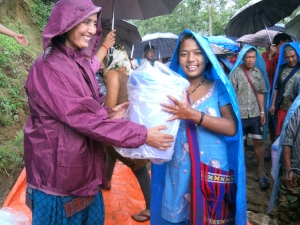This post was originally published by Empower Generation, which merged with Pollinate Energy to form Pollinate Group in 2018.
Last year in April and May Nepal was struck by massive earthquakes. Our local women-led distribution network acted quickly, bringing solar lights and phone chargers to remote villages, where they were immediately put to use aiding the search and rescue efforts and caring for the injured and the displaced.
It goes without saying that safety for our team has, and continues to be, our highest priority. Nevertheless Nepal’s lack of infrastructure and remote communities means our team has faced many challenges of getting solar to the people who need it.
In this firsthand account from our Program Coordinator Chanchala Dhakal, about a distribution in Likhu VDC in Nuwakot, we hope to give insight into the hardships our team encounters while trying to help the remote communities in Nepal.
“The distribution in Likhu VDC, Nuwakot, was the most difficult one. We hired a truck to go there. The road was like a ladder and the width of the road was only hardly big enough for the truck. Manju Kala and I were in the front seat, which for us was more comfortable than for the others who came with us to support our distribution, as they ware sitting cramped up in the back of the truck.
On the way to Likhu VDC we were bumping around like a ball inside the truck, because the road was so bad. When the truck could not go any further, we had to walk the last bit to reach the areas. We gratefully thanked the truck driver, who is used to driving on such dangerous paths. We had not seen any other vehicle within the last five hours. When we got to Likhu VDC, we noticed that some other people had already arrived before us and some others would arrive a bit later. People had come here by walking for up to nine hours. After half an hour, we started to distribute the lights and filters. Soon after we started, it started to rain heavily.
We finished our program at 5pm and were ready to go back. Unfortunately, the driver informed us that, after the heavy rain, the truck could not climb up anymore, because of the sticky mud. This was a bit worrying, as we could not see a another village nearby. Most of the villagers had already left, only 9-10 of them were left. I asked a man how far we would have to go to find a village where we could spend the night, if the vehicle could indeed not climb the road. He said we had to walk down for 5 hours to reach a village. This was tricky, because we were very near to the big jungle and it was still the time of after shocks. We asked some people if they could help pull up the truck. They dug out a lot of mud, made the road somewhat even and tied two ropes on the truck.
After trying hard for a while, step by step they pulled up the truck to a safe area. As we still could not sit inside the truck, we were walking on that muddy road and we got wet and very cold. Kala and Manju stopped talking, I think they were worried about their children. Slowly, the truck was now climbing up. It was already dark, the jungle was on both sides of the narrow road and it was still raining heavily. We closed our eyes and started to pray to God.
It was almost 11pm when we reached a safe place near Kathmandu. We took a taxi to my house, but it took some time before we fell asleep, even though we were exhausted by the journey. We did not know the village was situated so far from Kathmandu. The villagers always have to face this distance, which is incredibly hard, especially because the road is often very bad. Luckily, we could donate 140 d.light s20 and 140 water filters to the people of this off grid area, which gave us a lot of satisfaction.”
Every field trip we learn something new, about the people, about the environment, about the hardships of Nepal. Empower Generation is lucky to have such a determined team on the ground, and we are incredibly proud of the achievements in 2015 through Project Sol, our dedicated earthquake response. Also a warm thanks to Chanchala for sharing this story!

